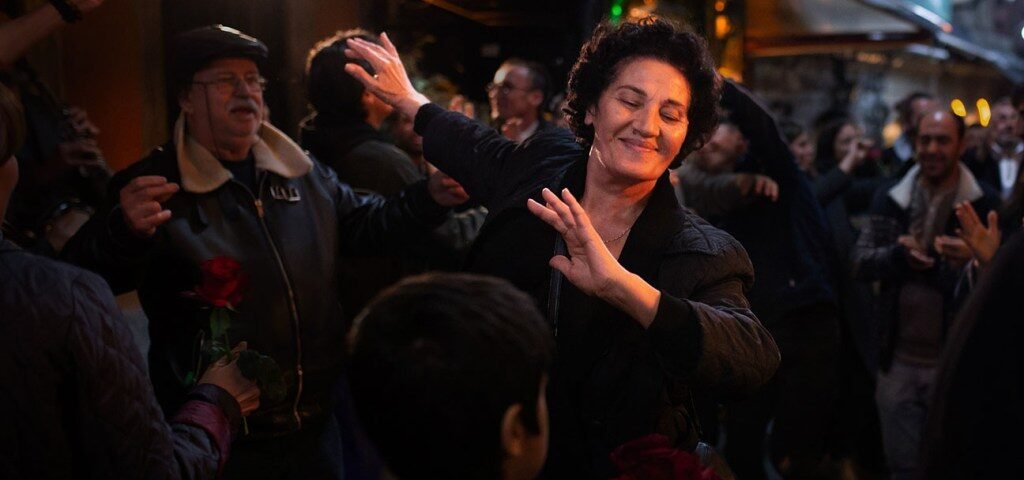


‘God & Country’ Review: A Bracing, Rob Reiner-Produced Primer on the Dangers of Christian Nationalism
February 21, 2024


‘Small Things Like These’ Review: Cillian Murphy Is Superb as a Haunted Man in Subdued but Powerful Irish Berlin Opener
February 22, 2024The Swedish director follows ‘And Then We Danced’ with a drama that draws from his dual ancestry, traveling from the Black Sea coast of Georgia to Istanbul.
Crossing
Eloquent and affecting.
In his 2019 breakout feature, And Then We Danced, Swedish writer-director Levan Akin examined gay self-discovery and defiant sexuality against the rigid gender codes of a traditional Georgian dance company. His warmly humanistic new film, Crossing, explores another story of queer identity in an unaccommodating environment, this time using an odd-couple journey to advocate for trans acceptance. Observed with granular detail and imbued with a pulsing sense of place, this novelistic drama takes time to connect its central triangle but does so with a suppleness and restraint that amplify the emotional rewards of its lovely open-ended conclusion.
Following its premiere as the opening film in Berlin’s Panorama section, Crossing is being released in key territories by Mubi and should further elevate Akin’s reputation, particularly with queer audiences. While it’s unspoken in the film, the anti-LGBTQ agenda of the Erdogan government adds weight to the drama and its message of compassion.
A stern woman in her 70s who fortifies herself with occasional swigs from a bottle of the strong Georgian grappa known as “chacha,” Lia bluntly informs Achi that she won’t be mothering him. The medications and ambulatory equipment in her home, along with the sorrow discernible beneath her acerbic demeanor, indicate that her sister has died recently and perhaps that Lia made a promise to find her missing daughter. That quest gives purpose to a life the retiree otherwise regards as spent.
Remarkable veteran actress Arabuli’s riveting performance expertly maintains the gruff, all-business countenance while making it clear by subtle means that her trip to Istanbul is a journey of atonement. There’s a quietly shattering moment late in the action when Achi asks what she would say to Tekla if she found her. Lia responds with moving candor, confessing to the ways in which she and her sister failed the young trans woman by letting the villagers’ disapproval outweigh their love for her.
Cinematographer Lisabi Fridell underscores the physical contrast between the Georgian opening and the main body of the drama in Istanbul with every bustling image of the city, notably a striking long shot of a built-up section crisscrossed by two elevated freeways. The shift is felt also in the transition from Georgian to Turkish folk music.
That human-animal connection is echoed in Lia’s gradual softening toward her flaky young companion, despite doing her best to ditch him early on. But the deeper transformation occurs when they encounter Evrim (Deniz Dumanl), a 30ish trans former sex worker who has recently earned a law degree from Istanbul University and is volunteering with an NGO fighting for trans rights.
Akin elegantly tracks Evrim’s story alongside that of Lia and Achi for an extended period, placing them in close proximity multiple times before they actually meet. A moment when the camera pans up from Lia and Achi on a ferry to capture Evrim gazing out from the upper deck is especially beautiful. Some viewers may grow impatient waiting for the inevitable junction where their paths cross or wish for more scenes of them together. But Akin’s unhurried storytelling moves to its own pleasurable rhythms, effectively building three robust character studies and intertwining them in emotionally affecting ways.
We experience Evrim’s unwarranted faith in a user boyfriend (Soner Yalcin) and her sweet flirtation with pirate taxi driver Omer (Ziya Sudancikmaz), who offers a taste of reciprocal romance without shame. We witness the considerable red tape, expense and hostile attitude involved in her efforts to obtain female ID papers. And we observe her interactions within the close-knit trans sisterhood along with her intervention when police pick up Izzet (Bünyamin Deger), one of two young street kids seen busking or hustling for tips as an impromptu guide for Lia and Achi.





